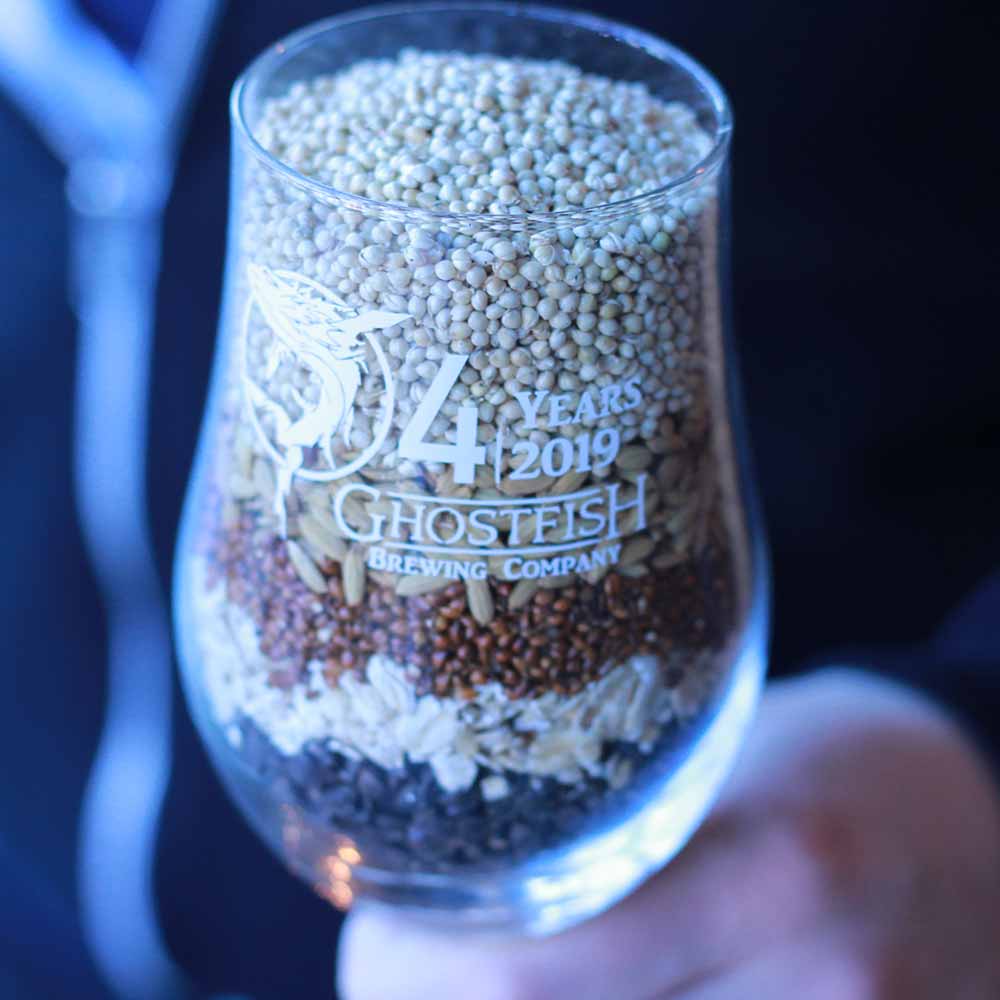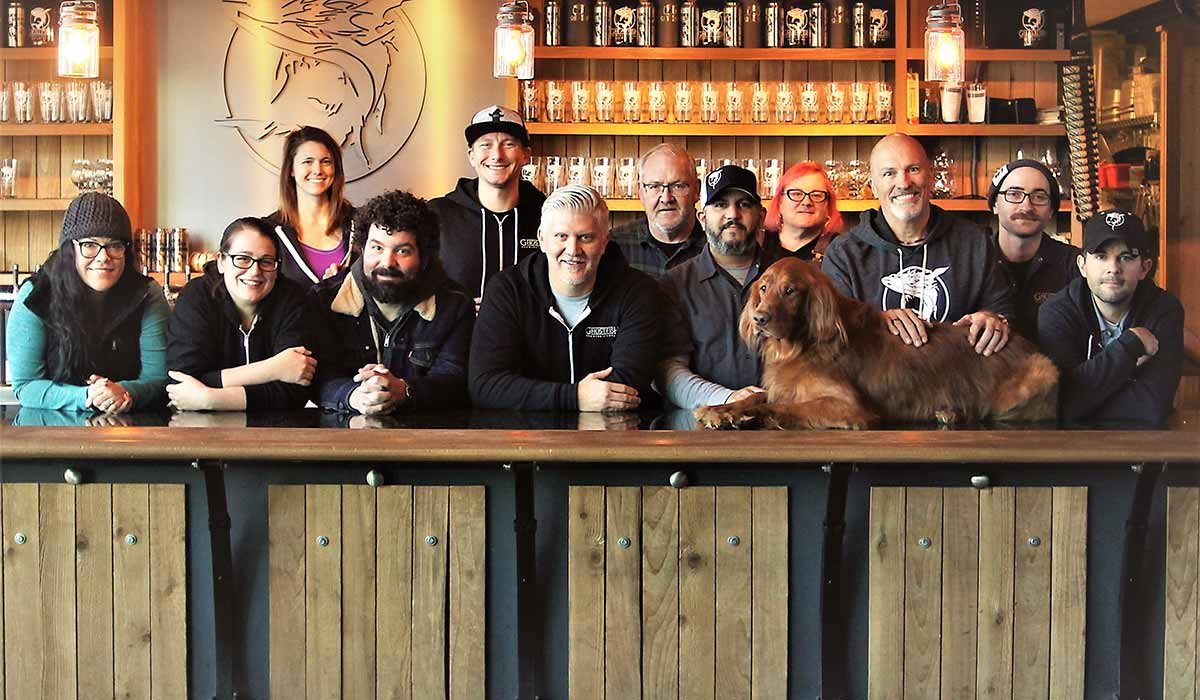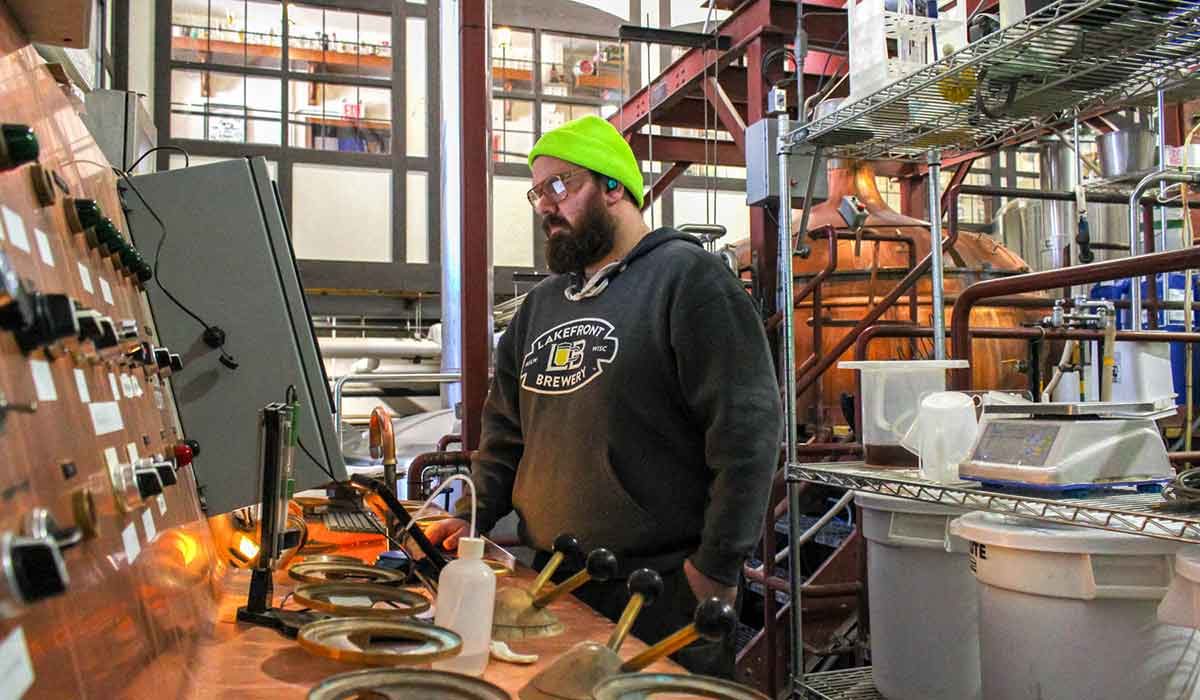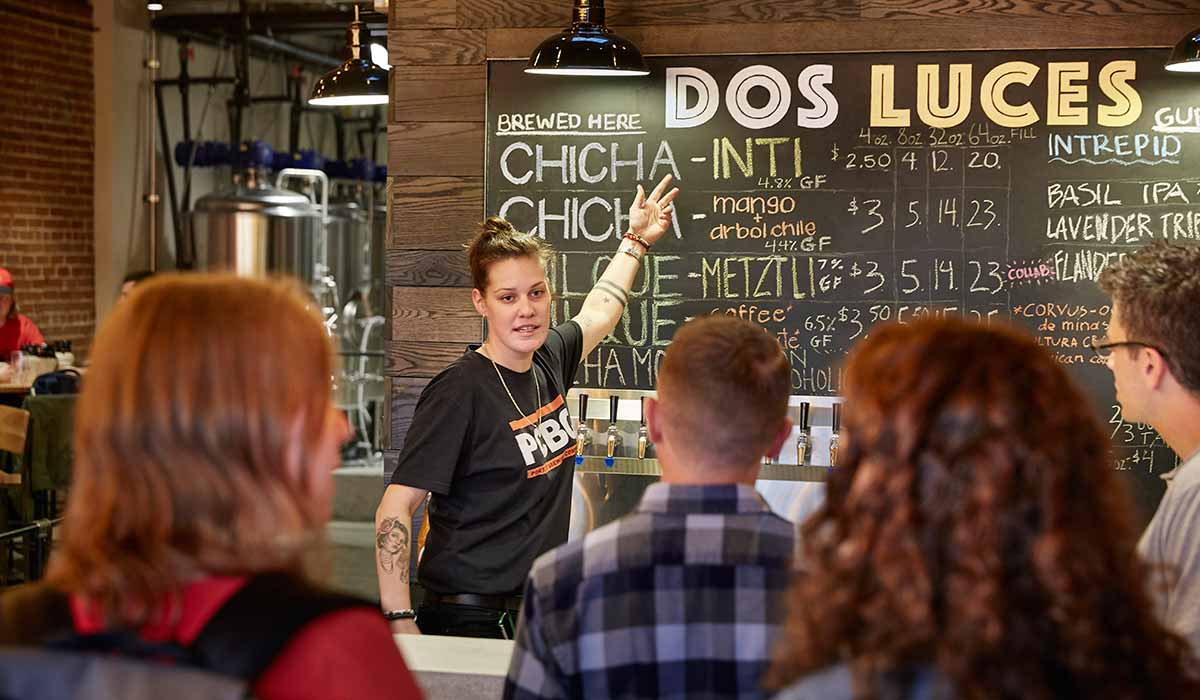With the proliferation of experimental and gluten-free beers a question comes up much more frequently these days: Can a fermented beverage without barley truly be called a beer?
We spoke to several independent brewers to understand what alternative grains bring to the already-crowded field of experimental beer ingredients.
[newsletter_signup_box]
To understand the fuss about whether beer can be barley-free, it helps to know a bit of history.
With origins dating to Prohibition in the 1920s, the Bureau of Alcohol, Tobacco and Firearms decreed that beer must have a minimum of 25 percent barley in the grain bill. Fermented beverages from other grains were typically relegated to the wine category.
But starting in 2006 the team at Lakefront Brewery in Milwaukee had different ideas. When his father was diagnosed with gluten intolerance, head brewer Luther Paul conceived of a gluten-free beer made with sorghum instead of barley.
The brewery approached the bureau at the annual Craft Brewers Conference with their idea, were told to file a Statement of Process. The brewery got the definition of beer expanded to include any cereal grains, removing the barley requirement.
Beers Without Barley
Fast-forward to today and brewers are turning out beers made from millet, corn, sorghum, rice, maguey, buckwheat and other ingredients. The majority serve the demand for gluten-free products but a minority taps into an interest in cultural and historic beers.

Brewers that we talked to noted some initial difficulty gaining customer acceptance due to the different tastes and lack of familiar flavors that non-traditional ingredients impart. For example, sorghum has a reputation for imparting metallic notes or off flavors, while other ingredients like corn give a completely unexpected experience. Brewers have spent significant time perfecting their recipes to approximate the flavor profile beer drinkers expect, or gone the opposite direction to create something unapologetically different.
Online feedback covers the spectrum from negative to “highly recommended” with people often awarding gluten-free sympathy points in their ratings. Different strokes for different folks perhaps? Let’s put the theory to the test.
In four short years, Ghostfish Brewing in Seattle has won numerous awards with beers crafted from millet, brown rice and buckwheat.
Owner Brian Thiel and his co-founders originally conceived of a typical barley-based craft brewery. But when Thiel’s wife was diagnosed with celiac disease the grain bill, but not the passion for great beer, took a detour. The brewery committed to making high-quality beer in traditional styles but using alternate grains that don’t contain gluten.
Despite brewing in a highly competitive region, Ghostfish concedes nothing to its barley-based brethren.
“The bar is set pretty high in the Pacific Northwest and we wanted to rise to the occasion,” Thiel says.
Ghostfish strives to make tasty traditional-style beers, from light ales through juicy IPAs all the way to robust stouts. It even experiments with kettle-souring and barrel-aging.
(READ: Booming Beer Agriculture Supports Local Breweries)
Ghostfish’s Long List of Different Beers
Illustrating the versatility of alternative grains in the right hands, Ghostfish counts more than 300 different beers brewed by its fourth anniversary in early 2019.
“There’s really nothing that we can’t do. These grains really don’t have any limitations or handicaps other than what we can dream up,” Thiel says.
With this take-no-prisoners approach, Ghostfish regularly bottles Winter Stout, Hot Pepper Beer, and Pumpkin Spice Belgian Ale.
“We’re just getting started,” Thiel says.

So is it beer? Thiel argues passionately that the answer is yes. The grains are different but “the product is virtually the same.”
“Everything we’re doing is pretty much the same fashion as everyone else is doing. There’s no question in our minds that this is beer,” he says.
Thiel says that many people don’t even realize that the beer is gluten- and barley-free.
Customer Chris Powell agrees wholeheartedly. Although he is not gluten-free, Powell chooses Ghostfish beers for their taste and thinks they stack up against any comparable style.
“There are other great IPAs I gravitate to, and I would put this right up against them,” says Powell. He says he views any taste differences as the natural outcome of different brewers making different recipes.
Tradition and History on Tap in Denver
Approaching non-barley beers from a completely different direction, Dos Luces Brewery in Denver taps into the themes of beer tradition and history to create Chicha and Pulque styles from corn and maguey, a relative of agave.
Owner Judd Belstock draws inspiration from the indigenous Americans who have been brewing these beverages for thousands of years, though they are relatively unknown to U.S. drinkers.
Chicha has attained a mystique as a chewed-corn beer used in high-Andes Inca religious ceremonies. But Belstock points out that modern-day Chicha production is virtually identical to barley-based beers.
Corn is ground in a mill and fermented in normal brewing equipment — no chewing or rituals required.
So how does it compare to barley-based brews? The hazy, yellowish appearance and small head look something like a New England IPA but the flavor is less familiar. Sipping the light-bodied brew brings a slightly sweet taste, along with spice. Belstock adds clove and cinnamon.
Lesser-known Pulque has a taste almost opposite of Chicha. Belstock describes it as a backward sour.
“Most sour beers hit you with that malty sweetness up front and a sour finish. This is the other way around. It hits you with a sourness up front and a sweet finish,” Belstock says. The beer also contains a hint of cloves and ginger.
(READ: Wisconsin Brewers Bringing Rare Styles Back to Life)
Brewing New Ideas Every Week
Looking to infuse some modern vibes into these basic historic styles, Belstock tries out new ideas in weekly small batch brews. He kicks things up with various spices, fruits and other flavorings.
With virtually unlimited possibilities, Belstock says he has yet to make the same batch twice.
One of the beers that made it to full-batch production is Azteca Pulque. Inspired by Mexican hot chocolate, it contains three types of chocolate plus a kick of cayenne pepper.

Given these radical departures from what most people expect from a beer, does Belstock believe they can truly be called beer? His answer is, perhaps unsurprisingly, yes, though some customers believe otherwise.
“We have a lot of customers who come in and say, ‘This isn’t beer.’ And not that they’re saying it’s bad but they want to convince me that it’s not beer,” Belstock says.
On the contrary, he says, both technically and historically Chicha and Pulque are beer.
“They all come from grains,” he says. And modern-day Chicha and Pulque production use the same techniques and equipment as barley-based beers.
Belstock also thinks that our historic European-centric view of beer could be much different.
“If the conquest had gone the other way we’d have 350 styles of corn beer and one category of barley-based European style [beer],” he says.
“On Paper it Looks Like a Pilsner”
Back in the heartland where it all began, Lakefront Brewing carries on brewing New Grist, its original gluten-free, pilsner-style beer.
With significant online discussion over whether New Grist technically meets the definition of beer, Lakefront’s Matt Krajnak qualifies the pilsner moniker.
“The closest thing is a pilsner but it doesn’t taste exactly like a pilsner. On paper it looks like a pilsner,” he says. “People are expecting it to be like a craft pils taste but that’s not really what we’re going for.”
What New Grist aims for is a light, crisp and refreshing profile, where green apple flavors from rice balance out the sorghum maltiness.

While Milwaukee’s German founders might not recognize this brew, Krajnak says this all-purpose beer has been slowly gaining acceptance outside of the gluten-free crowd.
Looking beyond the flagship pilsner, Lakefront uses its skills and imagination to create additional styles based on New Grist.
According to Krajnak the brewer constantly tweaks firkin batches with different flavorings and yeasts, and successful experiments go on to broader release. Past successes include a ginger-flavored variety, and this spring beer-drinkers can look forward to a gose.
(VISIT: Find a U.S. Brewery)
Answering the Beer Without Barley Question
So back to the original question of whether a brew can be beer without barley. The government, brewers and enthusiasts appear convinced.
While customers will always debate the merits of beer recipes with brewers, everyone seems to agree that the only real way to figure out if barley-free brews are for you is to take a few bottoms-up and decide for yourself.
Worst-case you’ll end up with an interesting story, and best-case find a new favorite beverage!
CraftBeer.com is fully dedicated to small and independent U.S. breweries. We are published by the Brewers Association, the not-for-profit trade group dedicated to promoting and protecting America’s small and independent craft brewers. Stories and opinions shared on CraftBeer.com do not imply endorsement by or positions taken by the Brewers Association or its members.


Share Post